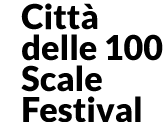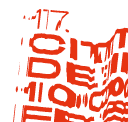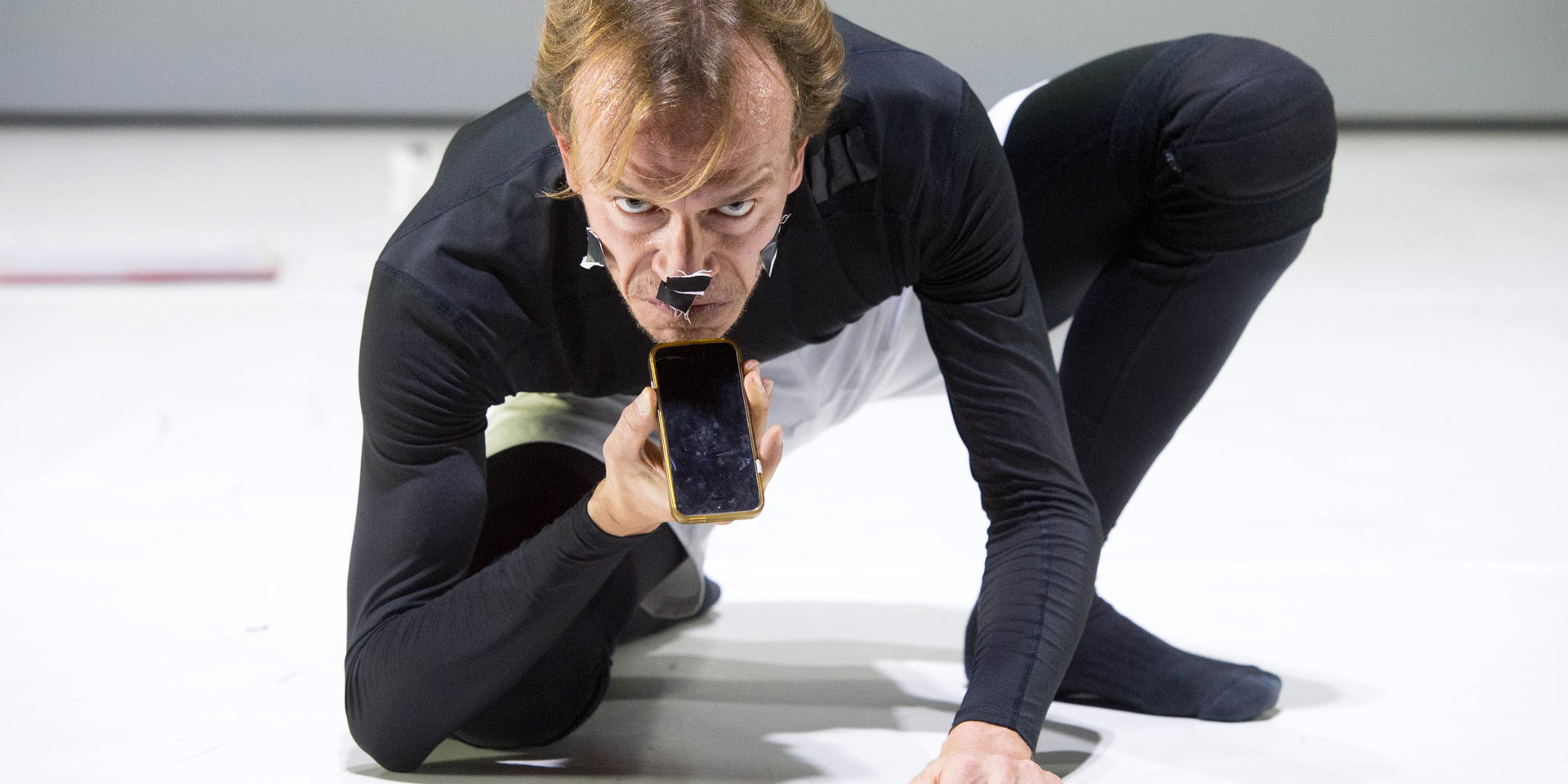Eugenio Barba has been accompanying Lorenzo Gleijeses for many years, as he wished to catch and enhance his education process, which the popular company of Hostelbro and the Odin Teatret had hugely influenced. The result of this fellowship were shows, meetings and seminars in Italy and Europe. They truly fortified the unique relationship between Barba, Julia Varley and Lorenzo Gleijeses up to this first direction signed by Barba (with Gleijeses) outside the Odin Teatret. Starting point were the echoes and the assonances of Kafka’s work, combined with the choreographic objects by Michele Di Stefano and Lorenzo Gleijeses. The result is a show with three different narratives: biographical information about Kafka; the story of the main character in La Metamorfosi: Gregorio Samsa; and that of an imaginary dancer having his same name, prisoner of the obsessive repetition of his performative plays, while waiting for a forthcoming debut.
Gregorio Samsa strongly believes that a high technical and interpretative preciseness is likely to be reached through an obsessive repetition of his scores ; none the less he himself is led by his perfectionism into a limbo with very pale boundaries between real and imaginary, work and intimate space, theatre and daily life. Therefere the collision between what the world is urging us to do and what we intimately feel and need. Are Samsa’s repeated choreographic sequences, like a new Sisyphus, due to a psychopathological drive? Or is he simply aiming to reach the best possible outcome and to overcome his human limits? The movements that Gregorio constantly tries are the result of professional commitment and work, so he gains such thoughtfulness and balance which he doesn’t prove in his daily life. Like a spider, Gregor can’t but spin his web. His artistic research is actually mirroring his own life, his searching for the freedom while chasing himself.
— Lorenzo Gleijeses
(translation by Caterina Cavallo)

Eugenio Barba. He was born in 1936 in Brindisi and grew up in the nearby village Gallipoli. His family’s situation considerably changed further to his father’s death (a military officer) during the II World War.
Upon completing High School at the Military Academy in Naples (1954) he changed his mind about the military carrer. In 1960 he went indeed to Norway and took degrees in French and Norwegian literature and in History of Religion at Oslo University. In 1961 he went to Warsaw (Poland) to study theatre direction at the State Theatre School, but left it one year later to join Jerzy Grotowski, director of Teatr 13 Rzedow in Opole. Barba collaborated with Grotowski over three years. In 1963 he travelled to India where he first experienced Kathakali, a theatre form which at that time had been overlooked by a significant majority of Western theatre scholars. Barba wrote an essay about Kathakali which was published in Italy, France, the USA and Denmark. His first book, In search of a Lost Theatre, came out in 1965 in Italy and Hungary. When Barba returned to Oslo in 1964, he longed to become a professional theatre director, but this proved to be harder than expected, He then gathered a group of young people who had failed their admission test to Oslo’s State Theatre School : the Odin Teatret was born in October 1st, 1964. The group trained and rehearsed in an air raid shelter. Their first production, Ornitofilerne, by the Norwegian author Jens Bjørneboe, was shown in Norway, Sweden, Finland and Denmark. They were subsequently invited by the Danish municipality of Holstebro, a small town in the Northwest, to create a theatre laboratory there. They were offered an old farm and a small sum of money to begin. Since then, Barba and his colleagues have made Holstebro the location for the Odin Teatret.
During the past thirty-six years Eugenio Barba has directed 23 productions, some of which have required up to two years of preparation. Among the best known : Ferai (1969), Min Fars Hus (My Father’s House) (1972), Brecht’s Ashes (1980), The Gospel According to Oxyrhincus (1985), Talabot (1988), Kaosmos (1993) and more recently Mythos (1998). Since 1974, Eugenio Barba and Odin Teatret have devised a new theatre dimension in a social context : the "barter". Afterwards, popular itinerant performing, acrobatics and the grotesque have become part of their dramaturgy. In 1979 Eugenio Barba founded ISTA, International School of Theatre Anthropology. He has joined the advisory boards of journals such as "The Drama Review", "Performance Research" and "New Theatre Quarterly". Among his most recent publications, translated into several different languages: The Paper Canoe (Routledge), Theatre: Solitude, Craft, Revolt (Black Mountain Press), Land of Ashes and Diamonds. My Apprenticeship in Poland, followed by 26 letters from Jerzy Grotowski to Eugenio Barba (Black Mountain Press) and in collaboration with Nicola Savarese, The Secret Art of the Performer (Centre for Performance Research/Routledge). Eugenio Barba has been awarded honorary doctorates from the University of Århus (Denmark), Ayacucho (Peru), Bologna (Italy) and the "Reconnaissance de mérite scientifique", University of Montreal (Canada). He has also received the Danish Academy Award in 1980, the Mexican Theatre Critics' prize in 1984, Diego Fabbri prize in 1986, Pirandello International prize in 1996 and on 19 April he won the Sonning Prize 2000 by the University of Copenhagen.
(teatrodinessuno.it/barba-eugenio)
Michele Di Stefano, He started the Company MK, an independent group based in Rome and focused on performance, choreography and sound research, whose projects - developed since 1999 - were shown during the most important contemporary festivals. The varied musical collaborations, the host performers, the thick net of innovative laboratories contributed to let the group quickly build prototypes of extemporary habitats. Among their last productions: Robinson, Il giro del mondo in 80 giorni, Quattro danze coloniali viste da vicino, Grand Tour, and Instruction Series. Besides shows and performances, Michele Di Stefano gives lectures and workshops, investigating unusual formats through hybrid projects like Wasted, Clima, Accademie Eventuali, Reform club and the recent Piattaforma della Danza Balinese, together with the italian choreographers Cristina Rizzo and Fabrizio Favale. MK is one of the five formats selected for the book Corpo sottile. Uno sguardo sulla nuova coreografia europea (Ubulibri, Milano 2003). In 2014 Di Stefano was awarded Leone d’argento per la Danza by Biennale Danza di Venezia.
(xing.it/person/537/michele_di_stefano)
Lorenzo Gleijeses He made his debut in 1991 with his father Geppy and Regina Bianchi (one of the most representative actresses of Eduardo De Filippo and Raffaele Viviani’s company). At an early age, he had the opportunity to work and train with the following directors: Luigi Squarzina, Armando Pugliese, Roberto Guicciardini (founder of Gruppo della Rocca). From 2000 to 2004 he explored different types of theatre systems, working with many international masters, including Lindsay Kemp, Eimuntas Nekrosius, Yoshi Oida, Odin Teatret, the Workcenter of Jerzy Grotowski, Augusto Omolù, MK. Since 2001 he’s been a pupil of Julia Varley, a popular member of Odin Teatret. They produced Il figlio di Gertrude (Gertrude’s son) which took them Ubu Award for Best New Actor in 2006 and a Best Newcomer nomination at the Oscar Olimpici at Teatro-Premi ETI. Lorenzo has worked with Alfredo Arias, Eugenio Barba, Michele Di Stefano, Fanny & Alexander, Nikolaj Karpov, Andrej Konchalovskij, Cesare Lievi, Mario Martone, Antonio Rezza and Flavia Mastrella, Luigi Squarzina, Rafael Spregelburd, Julia Varley, and others. Lorenzo has played many characters from the classic repertoire, including Romeo, Hamlet, the Prince of Homburg, Uncle Vanya, Harlequin, Mozart in Peter Shaffer’s Amadeus, Shakespeare’s Henry V-Prince Hal, Woyzeck and Leonce (in Büchner’s Leonce and Lena). His works have been hosted in some of the most representative theatres and festivals in Italy and abroad : France, Switzerland, the Czech Republic, Denmark, Poland and Argentina. Lorenzo has been directing workshops at DAMS in Bologna and in Turin, at Teatro di Roma, Mercadante Theatre in Naples, Teatro Stabile di Calabria, Punta Corsara project, National Theatre School /Mercadante. From 2009 to 2011 he was the author and artistic director of Quirino Revolution MAD, an international festival experimenting old historic Roman theatre and a new language research in performing arts. He has directed Antonio Rezza, Kinkaleri, Ivo Dimchev, Marco Manchisi, Enzo Cosimi, Marilù Prati and Renato Nicolini, Biagio Caravano/Sigourney Weaver, Gianfranco Berardi, Vidal Bini, Stella Zannou, Maya Lipsker, Roy Carroll, Pietro Babina, Carol Allaire, Zapruder Filmmakersgroup.
As a film actor Lorenzo has worked with Matteo Rovere, Michele Placido, Kim Rossi Stuart, Marco Tullio Giordana, Gabriele Lavia and Martone again.
In 2015 he produced 58° Parallelo Nord (58th Parallel North) where dromoscopy and bewilderment suggest artistic role plays in a shared creative process : the monocratic role of the demiurge artist is challenged. Eugenio Barba and Julia Varley (Odin Teatret), Michele Di Stefano and Biagio Caravano (MK), Luigi De Angelis and Chiara Lagani (Fanny & Alexander), Mirto Baliani and Roberto Crea are some of the fellow artists involved in this journey. This work brought them together in a kind of open theatre workshop. This shared creative process was completed in 2020 and resulted in two different stage performances starring Lorenzo: An ordinary day in the life of the dancer Gregor Samsa and Corcovado. In An ordinary day in the life of the dancer Gregor Samsa, Barba, Gleijeses and Varley (his first direction outside Odin Teatret) are cooperating with Lorenzo, while Corcovado was developed by Luigi De Angelis and Michele Di Stefano.
(lorenzogleijeses.com/bio/biography/)
Julia Varley She was born in 1954 in London, Great Britain, and joined Odin Teatret in 1976. Apart from acting she loves directing, teaching, organising and writing. At the age of three she moved to Milan, Italy, where she did her schooling, including Philosophy Studies at Milan University. Before joining Odin Teatret she worked in Milan at Teatro del Drago, Centro Sociale Santa Marta and Circolo La Comune, and earned her living as an assistant film producer. With Odin Teatret, Julia Varley has been teaching in schools and universities and has synthetised her experience into four productions: The Echo of Silence, The Dead Brother, Text, Action, Relations and The Flying Carpet. Since 1990 she has been involved in the creation and organisation of ISTA (International School of Theatre Anthropology) and of University of Eurasian Theatre, both directed by Eugenio Barba. Since its beginning in 1986 she has taken active part in The Magdalena Project, a network of women in contemporary theatre. She is also artistic director of Transit International Festival, Holstebro, and editor of The Open Page, a journal devoted to women's work in theatre. In the framework of The Magdalena Project, Julia also takes part in the project "Women with Big Eyes" which has been performed in Denmark and Cuba. In connection with Odin Teatret's intercultural productions and Holstebro Festuge, Julia has started an ongoing teaching partnership with groups of young actors ("Ageless", "Jasonites", "Ur-Hamlet Foreigners") both in Denmark and abroad. Julia Varley directs her students. She has directed two productions with Pumpenhaus Theater in Germany (Auf den Spuren des Yeti and Blau), two productions with Ana Woolf from Argentina (Seeds of Memory and White is the Night), a play for children with Hisako Miura from Japan (Fox Wedding) and two productions with Lorenzo Gleijeses and Manolo Muoio (Il figlio di Gertrude and L'esausto o il profondo azzurro) ; yet another one with Gabriella Sacco (The Taste of Oranges) from Italy. She has worked as assistant director for the films Anabasis and On the Two Banks of the River, and for the production of the film Come! And the Day Will Be Ours. She has written two books: Wind in the West - a novel by a theatre character (Odin Teatret Forlag, Denmark) and Notes of an Odin Actress - Stones of Water (Ubulibri, Milan; Escenologia, Mexico; Alarcos, Cuba; San Marcos-Yuyachkani, Peru; Entretemps, France; Routledge, UK). Her articles and essays have been published in journals such as The Mime Journal, New Theatre Quarterly, Teatro e Storia, Conjunto, Lapis, The Open Page, Performance Research, Teatro XXI and Máscara.
(odinteatret.dk/artistic-ensembles/odin-teatret/actors/julia-varley/)
Myrtle Baliani (Rome, 1977) is a musician, composer, sound designer, illustrator and DJ. Son of an artist, he spent his childhood in theatres and festivals performing different shows. After the Art Institute he began to work as graphic designer and illustrator and developed a personal combination of products and trainings for some stage productions. From 1997 to date he has written music and created sound scores for over forty productions ranging from theatre to dance, from radio programs to documentaries and short films , soundtracks for exhibitions and performances. His works have been performed at Auditorium Parco della Musica in Rome, Toneelhuis di Anversa, Music Biennale Zagreb MBZ, in Sarajevo, Brussels, Belgrade, Berlin, Nairobi, Lisbon and in Italy. In 2011 he initiated a personal theater research about the nature of sound and its relationship with matter. The first stage of this process is O-Wisp, a concert for items and cooking rings based on heating process. With China vs. Tibet he continues his research about a new musical drama.
(mirtobaliani.com)













